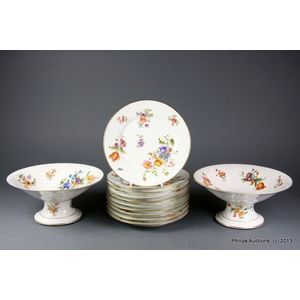Mason's Imari Ironstone Comport, 1830-48
You must be a subscriber, and be logged in to view price and dealer details.
Subscribe Now to view actual auction price for this item
When you subscribe, you have the option of setting the currency in which to display prices to $Au, $US, $NZ or Stg.
- Comport - A comport is a type of decorative serving dish or bowl, typically used for desserts, fruits or other sweet treats. The comport is usually made from glass, silver or porcelain, which are materials known for their elegance and durability. They are often beautifully designed and decorated, and can be used as an elegant and decorative centerpiece for a table or dining room. They are also widely used as a decorative piece on the mantelpiece, sideboard, or other areas of the house.
- Ironstone China - Credit for the invention of ironstone china is generally accorded to Charles Mason in 1813. Charles Mason was one of the two sons of Miles Mason who founded the Mason works in 1802, and ran the business with his brother George Mason.
Ironstone was a heavy hard earthenware which was slightly translucent, its strength supposedly coming from a very small quantity of iron slag added to the mixture. The additional strength enabled the company to make larger objects that were not susceptible to breakage.
The company manufactured dinner wares, toilet sets, tureens, jugs and so on, and the most popular patterns were blue and white, floral and Oriental Imari style colours.
The trade name "Patent Ironstone China" was registered by the company in 1813, but the patent was only valid for 14 years and was not renewed, enabling other potteries to use the word "ironstone" in describing their wares.
Mason wares are generally well marked with "Mason's Patent Ironstone China" .
This item has been included into following indexes:
Visually similar items

A Masons Ironstone Imari tureen, 19th century, with stamp of 1820 period onwards, pattern 2162, the lobed footed tureen decorated with cobalt, iron red and wheat colours with accents of blush pink, green and gold, with foliate patterns and trailing floral

A French Limoges porcelain dessert setting, circa 1930s, comprising ten plates and two footed comports, strewn with colourful summer flowers upon a white ground; stamped underside, comport height 10.5 cm. Diameter 22 cm. Plate diameter 20 cm

Antique Wallendorf porcelain comport, 16 cm high, 27 cm diameter

A 'Celtic harvest' teapot by Clarice Cliff, late 1930s, the heavily moulded globular teapot with a fruit encrusted 'C' form handle, conforming finials and a wheat sheaf motif to the textured body in autumnal tones, emerald and apple green on a deep cream g
